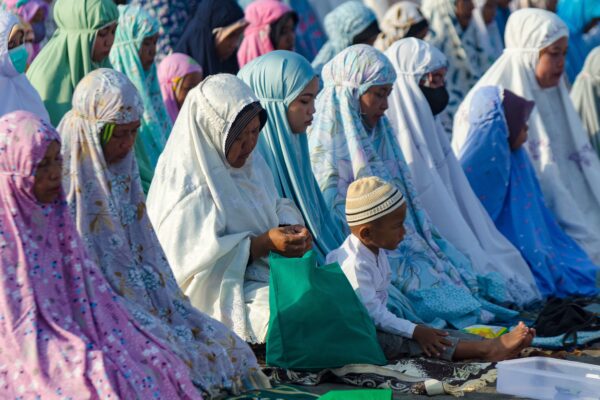In the Name of Allah, the Most Kind, the Most Merciful
According to many narrations, the 15th night of Sha’baan, known as Layl-atul-Baraa’a, is one of the most powerful nights in the Islamic calendar.
The month of Sha’baan is part of a three month long trajectory of spirituality; a banquet of opportunity to benefit in the blessings of personal development and self-realisation. This period gifted by Allah swt starts with the month of Rajab culminating in the crescendo of Layl-atul-Qadr, or the Night of Power in the holy month of Ramadan, where the following years divine decrees for the universe are ordained.
In these three months, great emphasis is laid on fasting during the days, standing in the nights for prayer, increased recitation of Qu’ran, supplication and devotional acts toward Allah swt. For example in the supplication known as the Salawaat of Sha’baaniyyah, the holy Prophet Muhammad’s (s) great grandson, Ali ibn al-Hussain Zain al-‘Abideen (d. 95 AH) (a) would recite daily,
“This is the month of Your Prophet and the Master of your Messengers. It is Sha’baan which you have encompassed with Your Mercy and Pleasure, and on which the Messenger of Allah used to observe fasting and used to spend it in acts of worship on all of its days and nights on account of Your honouring and dignifying this month, up until his death.”[1]
Elsewhere Caliph ‘Ali ibn Abi Talib is recorded to have recited the Munajaat or intimate prayer of Sha’baniyyah each night including phenomenal verses such as,
“Oh my Lord, I now imagine how I will stand before You, shaded by my good opinion of You on account of my trust in You. If my time of death is approaching while my deeds are too little to present to You, then consider this confession of being guilty as my means of proximity toward You.”[2]
The merits of the 15th night of Sha’baan have been recorded in the major books of tradition and is generally agreed upon by all schools of thought. For example, in the Sunni school of tradition the holy Prophet Muhammad (s) is narrated to have said,
“Indeed Allah observes His creation on the night of the middle of Sha’baan and He forgives His creation except the polytheist and rancourous envying person.”[3]
In the Shi’a school of tradition, the night bears additional greatness for being the birth-date of the Awaited Saviour of Humanity’ Imam al-Mahdi (a). One of the leading scholars, Sayyid ibn Tawus stated,
“It is best to sanctify this night because of the birth of the ‘Awaited Leader’ in it. Let every person from mankind rise up on this night to gratify Allah swt for what He has bestowed on us through this noble man.”[4]
As a Muslim, whether we believe Imam al-Mahdi (a) has been or will be born is secondary. What is primary is our unifying belief in him, his mission and our desire to commit to his noble movement to spread justice and peace throughout the world. That being the case, on such a holy night, so much linked to the ‘Awaited Saviour of Mankind’, I would like to humbly offer two pieces of advise that have inspired me in my journey of preparation for Imam al-Mahdi (a) so as to maximise the spirituality of this night.
The first is a bewildering narration between Imam Ja’far as-Sadiq (d. 148 AH) (a) and his disciple ‘Abd al-Kareem ibn ‘Amr. The companion addresses Imam as-Sadiq (a) and says,
“I have taken it (an oath) upon myself to fast (every day) until the rising of al-Mahdi.”
Before I continue the narration, let us reflect on two issues. The first is that the disciple believed that Imam al-Mahdi’s (a) appearance was not imminent, rather there was to be many generations to come and then a lengthy occultation. This suggests that the companion himself did not expect to witness the appearance of Imam al-Mahdi (a), but whether he was to live another ten, or twenty or fifty years or never witness Imam al-Mahdi (a), he was willing to prepare himself through this act of devotion and commitment, in his own way. The second is that one may respond and say ‘Surely this is extreme, to fast every day in preparation for Imam al-Mahdi is excessive.’ Imam as-Sadiq (a), being the foremost theologian and jurist of the time would never permit something excessive in the way of Islam, especially as the holy Qur’an adjures, “Do not go to extremes in your religion” (4:171 and 5:77).
How did Imam as-Sadiq (a) respond? He stated, “Fast! But do not fast when travelling, on the Two Eids[5], the days of the 11th, 12th and 13th of Dhul Hijjah[6] or Days of Doubt.[7]” That Imam as-Sadiq (a) guided his action demonstrated that he was pleased with and encouraged this commitment to Imam al-Mahdi (a) and such personal forms of discipline![8]
Why are we mentioning this Hadith? I am not suggesting we all take an oath to fast each day of our life! Rather it is inspirational to observe how committed companions of the earlier generations were to Imam al-Mahdi (a) and their preparation for him (a). The question I ask myself as the night of the 15th of Sha’baan approaches is, ‘What commitment will I make to Imam al-Mahdi (a) tonight?’ Just like the disciple ‘Abd al-Kareem ibn ‘Amr, I may never get to witness him (a) or partake with him (a), but whether I do or do not is secondary, my commitment and preparation for him (a) is primary and so I find myself asking, ‘What one thing will I commit to Imam al-Mahdi (a) for the rest of my life…?’
The second piece of advise I would like to share with you refers to the practice of writing to Imam al-Mahdi (a) known as Areezah. Many Muslims, wishing to increase their link with Imam al-Mahdi (a), write on a piece of paper addressing their hopes in Allah for increase in faith, sustenance, health, family, education and success in the hereafter. This practice invokes the verse of the Qur’an
“Oh you who believe! Have God-consciousness, and seek a means of nearness to Him (swt) and strive hard in His cause so that you may succeed” (5:35)
For those Muslims that practice or would like to practice this tradition, I suggest performing it in a slightly different way this year. Firstly, instead of taking one paper, this year take two. With your first one, imagine yourself in the position of Imam al-Mahdi (a), the ‘Awaited Saviour of Humanity’ and ‘The flag of guidance in our era’. Ask this question to yourself: Instead of me writing to him (a) what if this year, Imam al-Mahdi (a) wrote to me, what would he wish to say to me on that letter? What would he address with me? His guidance; his concerns; his recommendations; his advise but to me…
And then begin to write, to yourself, as if the ‘Leader of the Age’ were writing to you…
Your experience of the Areezah tradition will drastically evolve, I promise you. You will view the letter from the perspective of Imam al-Mahdi (a) and his expectations of you, as oppose to your expectations in him (a). Having finished that first letter and seen the content of ‘his’ address to you, now begin to write your Areezah to him and observe the content. Does his (a) concerns match yours? Does his (a) guidance match what you had supplicated to Allah about? What did he wish to convey to you that is similar or different to your letter to him (a)?
In these days of war, occupation, poverty, disease, forced migration and disaster, the Muslim community and the world is in desperate need of Allah swt’s ‘Promised Saviour’. The Muslim community is inching slowly away from his remembrance and preparation and vesting hope and delivery in politicians and NGO’s and Kings. Whilst these individuals may bring benefit, the night of the 15th of Sha’baan reminds us of Imam al-Mahdi (a) so that we have an opportunity to reflect on our relationship with him and how we may commit to his movement.
IshaAllah this years worship and devotions on the night of the 15th of Sha’baan will be the last year of waiting for Imam al-Mahdi (a). May tonight bring us much benefit, however we choose to engage in its blessings.
References
[1] http://www.duas.org/shabansalwat.htm
[2] http://www.duas.org/invocation.htm
[3] إن الله ليطلع ليلة النصف من شعبان، فيغفر لجميع خلقه، إلا لمشرك أو مشاحن (Ibn Majah, at-Tabarani and authenticated by Albani)
[4] ينبغي ان يكون تعظيم هذه الليلة لأجل ولادته عند المسلمين و المعترفين بحقوق إقامته ، أقول وليقم كل انسان لله جل جلاله في هذه الليلة بقدر شكر ما من الله عز وجل عليه بهذا السلطان (As-Sahifa al-Mahdiya, Supplication for the Night of the Middle of Sha’baan)
[5] ‘Eid al-Fitr and ‘Eid al-Adh’ha
[6] Ayyaam at-Tashreeq, communal days of celebration
[7] Such as doubt whether it is the last day of Sha’baan or Shahr Ramadhaan, which require a specific intention
[8] أني جعلت على نفسي ان أصوم حتى يقوم القائم ، صُم و لا تصم في السفر و لا العيدين و لا ايام التشريق و لا اليوم الذي يشك فيه (Wasaa’il as-Shi’a, Book of Fasting, Chapter 6, Hadith no. 3





